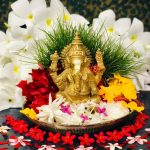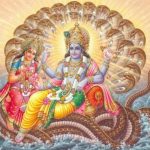Parsva Ekadashi, also known as Parivartini Ekadashi, is a significant day in the Hindu lunar calendar. It falls on the eleventh day (Ekadashi) of the Shukla Paksha (waxing phase of the moon) in Bhadrapada month occurs in August or September. This day is dedicated to Lord Vishnu and holds special importance as it marks the day when Lord Vishnu, believed to be meditative during his four-month rest period (Chaturmas), turns to his other side.
The Story Behind the Day
There’s an old story about Parsva Ekadashi. It’s said that Lord Vishnu turned on his side on this day after a long sleep. This “turning” is why some call it Parivartini Ekadashi. The story teaches us about change and new beginnings.
Significance of Parsva Ekadashi
Observing Parsva Ekadashi is believed to bring blessings, peace, and prosperity. Devotees fast on this day to seek forgiveness for their sins and to attain spiritual growth.
It is said that those who observe this fast with devotion can free themselves from the cycle of birth and death and achieve salvation. This Ekadashi is also linked to the story of King Bali and Vamana Avatar of Lord Vishnu, highlighting the victory of good over evil.
Benefits of Observing Parsva Ekadashi
Observing Parsva Ekadashi offers several spiritual benefits.
- It is believed to cleanse the mind and soul, leading to inner peace and clarity.
- The fast helps develop self-discipline and strengthens one’s resolve against worldly temptations.
- It is also said to bring prosperity, good health, and protection from negative energies.
- Most importantly, it provides a path toward spiritual liberation and divine blessings.
People believe that keeping the Parsva Ekadashi fast brings blessings. They think it can wash away bad deeds and bring good luck. It’s also a chance to practice self-control and think about what’s really important in life.
Rituals and Observance
On Parsva Ekadashi, devotees wake up early, take a holy bath, and offer prayers to Lord Vishnu. Fasting is a major part of this day, where some may opt for a complete fast, while others may consume fruits and milk. Devotees visit Vishnu temples, chant mantras, and read scriptures like the Vishnu Sahasranama. The day is spent in meditation, charity, and performing acts of kindness.
Breaking the Fast (Parana Time)
The fast is traditionally broken on the next day, Dwadashi, after performing morning prayers. The specific time to break the fast, known as Parana, varies and should be followed as per the local calendar. Observing the fast with faith and dedication on Parsva Ekadashi is believed to cleanse the soul and lead to divine blessings.
You don’t have to be super religious to find meaning in Parsva Ekadashi. It’s a day to reflect, be kind, and try to be a better person. Whether you fast or not, taking time to think about your life and how to improve it can be good for anyone.
Feature Image Credit: Pinterest.




